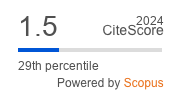Exploring user reviews to identify accessibility problems in applications for autistic users
DOI:
https://doi.org/10.5753/jis.2023.3238Keywords:
user review, accessibility, mobile educational apps, Autism Spectrum DisorderAbstract
The Google Play Store provides various user reviews that can provide information about user experience, usability, and accessibility. Despite multiple studies addressing these reviews’ importance and contributions to improving interactive systems, accessibility for users with Autism Spectrum Disorder (ASD) is still little discussed in this context. Considering the potential of user reviews, this article presents a textual analysis of reviews extracted from eight educational applications available in Portuguese with a focus on autistic children, namely: “ABC Autismo”, “Aprendendo com Biel e seus amigos”, “AutApp Autismo”, “Autismo projeto integrar”, “Jade Autismo”, “Matraquinha”, “OTO (Olhar Tocar Ouvir)” and “Teacch.me”. We conducted an analysis based on the Guidelines for Accessible Interfaces for People with Autism (GAIA) and the BBC Mobile Accessibility Guidelines to classify user reviews.
Downloads
References
Abdul Aziz, N. S., Ahmad, W. F. W., and Zulkifli, N. J. b. (2015). User experience on numerical application between children with down syndrome and autism. In Proceedings of the International HCI and UX Conference in Indonesia, pages 26–31.
Acosta-Vargas, P., Salvador-Acosta, B., Salvador-Ullauri, L., Villegas-Ch., W., and Gonzalez, M. (2021). Accessibility in native mobile applications for users with disabilities: A scoping review. Applied Sciences, 11(12).
Aljedaani, W., Mkaouer, M. W., Ludi, S., and Javed, Y. (2022). Automatic classification of accessibility user reviews in android apps. In 2022 7th International Conference on Data Science and Machine Learning Applications (CDMA), pages 133–138.
Alqahtani, F. and Orji, R. (2019). Usability issues in mental health applications. In Adjunct Publication of the 27th Conference on User Modeling, Adaptation and Personalization, pages 343–348.
Association, A. P. et al. (2014). DSM-5: Manual diagnóstico e estatístico de transtornos mentais. Artmed Editora.
Branco, K. d. S. C., Pinheiro, V. M. d. S., Damian, A. L., and Marques, A. B. (2020). Investigating the first user experience and accessibility of educational applications for autistic children. In Proceedings of the 19th Brazilian Symposium on Human Factors in Computing Systems, pages 1–10.
Britto, T. C. P. and Pizzolato, E. B. (2016). Gaia: uma proposta de um guia de recomendações de acessibilidade de interfaces web com foco em aspectos do autismo. Revista Brasileira de Informática na Educação.
Da Silva, T. H. O., Freitas, L. M., Mendes, M. S., and Furtado, E. S. (2019). Textual evaluation vs. user testing: a comparative analysis. In Anais do X Workshop sobre Aspectos da Interação Humano-Computador para a Web Social, pages 21–30. SBC.
Diniz, L. d. N., de Souza Filho, J. C., and Carvalho, R. M. (2022). Can user reviews indicate usability heuristic issues? In Extended Abstracts of the 2022 CHI Conference on Human Factors in Computing Systems, CHI EA ’22, New York, NY, USA. Association for Computing Machinery.
Eler, M. M., Orlandin, L., and Oliveira, A. D. A. (2019). Do android app users care about accessibility? an analysis of user reviews on the google play store. In Proceedings of the 18th Brazilian Symposium on Human Factors in Computing Systems, pages 1–11.
Freitas, L. M., da Silva, T. H. O., and Mendes, M. S. (2016). Evaluation of spotify: an evaluation textual experience using the maltu methodology. In Proceedings of the 15th Brazilian Symposium on Human Factors in Computing Systems, pages 1–4.
Genc-Nayebi, N. and Abran, A. (2017). A systematic literature review: Opinion mining studies from mobile app store user reviews. Journal of Systems and Software, 125:207–219.
Koyani, S. J., Bailey, R. W., Nall, J. R., Allison, S., Mulligan, C., Bailey, K., and Tolson, M. (2004). Research-based web design & usability guidelines. Computer Psychology Washington, DC.
Magaton, H. C. and Bim, S. A. (2017). The use of educational applications by children with autistic spectrum disorder: A case of study. In Proceedings of the XVI Brazilian Symposium on Human Factors in Computing Systems, pages 1–10.
Marques, A. B. and da Silva Monte, L. (2021). How are software technologies being evaluated with autistic users? a systematic mapping. Universal Access in the Information Society, pages 1–11.
Marques, A. B., Melo, G. A., Pereira, V. G. R., and de Vasconcelos, P. F. C. (2021). Criação e avaliação de personas para sistemas com foco em pessoas com transtorno do espectro autista: Um relato de experiência sobre o uso de netnografia. iSys-Brazilian Journal of Information Systems, 14(3):68–97.
Melo, A., Santos, J., Rivero, L., and Barreto, R. (2017). Searching for preferences of autistic children to support the design of user interfaces. In Proceedings of the XVI Brazilian Symposium on Human Factors in Computing Systems, pages 1–10.
Santiago, M. T. and Marques, A. B. (2022). Are user reviews useful for identifying accessibility issues that autistic users face? an exploratory study. In Proceedings of the 21st Brazilian Symposium on Human Factors in Computing Systems, IHC ’22, New York, NY, USA. Association for Computing Machinery.
Vu, P. M., Nguyen, T. T., Pham, H. V., and Nguyen, T. T. (2015). Mining user opinions in mobile app reviews: A keyword-based approach. arXiv preprint arXiv:1505.04657.
Wang, C., Liu, T., Liang, P., Daneva, M., and van Sinderen, M. (2021). The role of user reviews in app updates: A preliminary investigation on app release notes. In 2021 28th Asia-Pacific Software Engineering Conference (APSEC), pages 520–525.
Downloads
Published
How to Cite
Issue
Section
License
Copyright (c) 2023 Mara Taynar Santiago, Anna Beatriz Marques

This work is licensed under a Creative Commons Attribution 4.0 International License.
JIS is free of charge for authors and readers, and all papers published by JIS follow the Creative Commons Attribution 4.0 International (CC BY 4.0) license.








